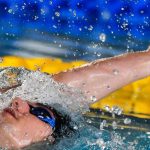The Talents Factory
What does it mean to have a “talent” for swimming? What are the distinctive traits that make a swimmer a young “talent”? Here are some thoughts….
The talents factory is the very top of the most delicious cake; it is the sweetest cherry of all, but also the bitterest to taste. Talent means willpower, virtue, determination and desire. It is, above all else, a gift: divine according to believers, natural for our secular friends.
I have deliberately used the plural “talents” in the title, not so much to refer to all the different athletes in question, as all the different abilities, behavioural qualities, habits, skills and attitudes that make up a TALENT.
When I think about spotting talent, I do not so much think of a group of scientifically selected children with exceptional motor skills who are genetically advantaged, but rather of a miscellaneous group of children of different age, size, ability, physical qualities and levels of interaction and motivation (i.e. our ordinary Peters and Janes).
Question: do all children have talents? The answer is…..yes! One single talent will not turn a swimmer into a champion and, vice-versa, the lack of any particular talent will not prevent a swimmer from becoming one; that is because nobody has every single talent and nobody is completely lacking in talent (talents can be divided into three sets: psychological qualities or abilities, physical qualities or skills, anatomical features). Spotting talents is like “fishing” with a very wide net.
Often children are not aware of the abilities they have until a farsighted coach points it out to them; and it is at that exact moment, when the coach manages to define the concept of “success” associated with improving and not winning, that any little dolphin can set off on the path towards developing their own qualities.
Question: how much does “the environment” influence the development of the qualities associated with talent from a long-term perspective? Answer: a lot! But let me qualify that: by environment I mean all those different factors, like parents, coaches and training plans, that are crucial for developing a talent and which require working together.
Parents have an enormous influence on their children’s careers: encouraging determination, making them accept their own responsibilities, helping them during difficult periods, teaching them to keep their feet on the ground when they get carried away, trusting the trainer and realising that it takes a long process of training to develop just the right mentality in their children, who are now athletes.
After all, it is the coach’s responsibility to nurture the talent in all of their athletes; they must always know how far their athletes can go and how they can get them there, creating a culture of excellence. An attentive coach learns much more from his/her swimmers than they learn from him/her.
Written by:
Eugenia Panettieri
Although I was born in Apulia, I work in Tuscany. I am a FIN (Italian Swimming Federation) coach, FIN regional instructor for Tuscany and official judge-referee. I am deeply interested in the technical side of swimming and always on the lookout for new drills and exercises. My favourite “human subject matter” are adults and young beginners. I am totally in love with water in all its different forms. My motto is: “Really experience the water”.







